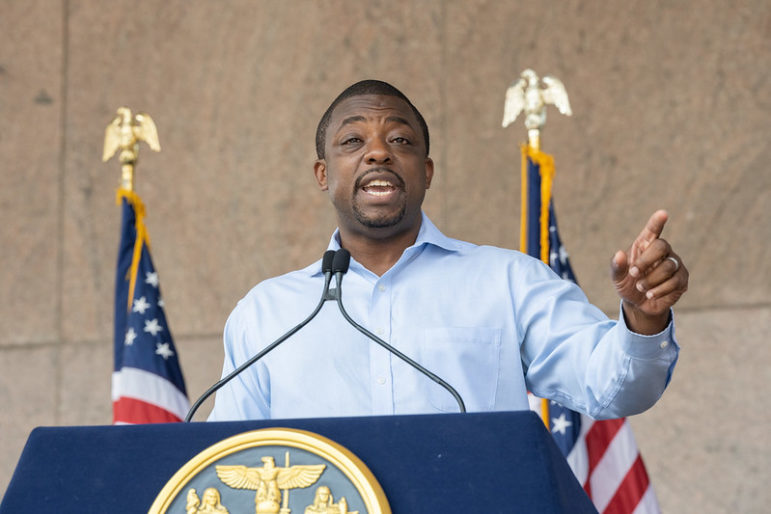While virtually anyone can file a petition with the state to run as an independent in a special election like this one, the Democratic nominee in this race will be selected through the Manhattan Democratic Party’s competitive county committee process, instead of a primary election.

Darren McGee- Office of the Governor
State Sen. Brian Benjamin at a press conference last week, where Gov. Hochul announced him as her pick for lieutenant governor.
Brian Benjamin, the state senator announced last week as new Gov. Kathy Hochul’s lieutenant governor, has represented his uptown district—which includes the Upper West Side, East Harlem, and Harlem—for the last four years.
His rise to lieutenant governor will prompt a special election for the seat that will coincide with the November 2021 general election, Hochul said last week.
“I am delighted that he said yes to be my lieutenant governor,” Hochul told reporters after the announcement, explaining that Benjamin won’t be sworn in until after Labor Day so that the special election to replace him—which under a new state law can only take place 60 days after the seat becomes vacant—can land the same day as the general election, when New Yorkers will be casting votes anyway for mayor, City Council and other offices.
“My goal is to make sure that we have high voter participation and lower costs for taxpayers,” Hochul said.
Benjamin won the 30th Senate District seat in a 2017 special election himself, succeeding Bill Perkins, who had been elected to the City Council.
Though he is yet to officially vacate his seat, some local elected officials are already jockeying to fill Benjamin’s post, sources say. Uptown Assembly members Al Taylor and Inez Dickens, who represent adjoining parts of the 30th Senate district, are said to be considering runs.
While virtually anyone can file a petition with the state to run as an independent in a special election like this one, the Democratic nominee in this race will be selected through the Manhattan Democratic Party’s competitive county committee process, instead of a primary election.
Candidates interested in the party’s support—which virtually assures a win in the heavily-Democratic district—must be nominated by county committee members, who later vote on a standard-bearer.
“Essentially, the thought behind what the county committee process is—which is how the Democratic Party chooses their nominee—is that because we are outside of a normal election cycle for that position, that the best people suited … to figure out who the Democratic nominee should be are the members of the Democratic county committee who live in the district” where there is a vacancy, said Kyle Ishmael, the executive director of the Manhattan Democratic Party.
County committee members in Manhattan, who make up “the most grassroots level of the party,” Ishmael said, are elected every two years. Around 300 members will vote to nominate a Democratic candidate in the looming special election, he said.
It’s a process similar to the one Benjamin went through to become the party’s nominee in the March 2017 special election, one that saw him face off against some of the same candidates believed to be considering bids for the seat now.
@assemblymanalt1 says he plans to run for @NYSenBenjamin State Senate seat now that Benjamin will vacate it to serve as Lieutenant Governor pic.twitter.com/TlRIRZWuzH
— Zack Fink (@ZackFinkNews) August 26, 2021
Taylor, who represents a strand of Manhattan neighborhoods north of 145th Street, criticized the county committee process in 2017, saying it was rigged by party insiders to favor Benjamin.
“Some people do have criticisms” of the process, Ishmael said, “and I think that they’re valid.”
But, he added, it’s really meant to cut down on the amount of time and money spent on special elections, which historically see very low voter turnout.
“In theory, it makes all the sense in the world: you’re nowhere near an election for this race, so, rather than spend money setting up an election for one district at a random time, have these members—who are committed members of the Democratic Party—come together and decide who their nominee is going to be,” he added. “And then it goes on for a public vote at the next election.”
The winner of the coming special election will also have to run for reelection in the Democratic primary for the seat next June. By then, the boundaries of the district itself will likely have changed, as districts in the state are expected to be redrawn this year through the redistricting process following the 2020 Census.










5 thoughts on “Brian Benjamin’s Rise to Lieutenant Governor Leaves His State Senate Seat Open. What Happens Now?”
good article!
Good article for those who don’t understand the process.
Excellent teaching resource on county committee process. There’s a need for a follow up piece now that field has widened considerably.
Al Taylor had nothing to say about the process when he was hand picked when Denny Farrell decided to retire 5 days before primary day. Currently Taylors Assembly District is a mess from landlord, and developer corruption, no constituent services, and continues to do nothing about it. It would be great if Citylimits investigated the hires at Taylor’s office. How he hired his parishioners to work in his district office is unacceptable.
Anyone interested in becoming a County Committee member in 2022, please check out my website https://repmyblock.nyc
We need 17,000 members across every district of New York City.